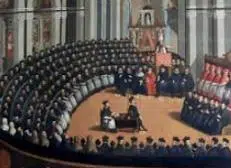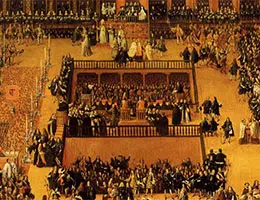 The term council , whose origin is found in the Latin word concilium , refers to a meeting that is held with the objective of dealing with a matter of interest. The documents that arise from said meeting are also called council.
The term council , whose origin is found in the Latin word concilium , refers to a meeting that is held with the objective of dealing with a matter of interest. The documents that arise from said meeting are also called council.
For example: “The Uruguayan businessman will join the World Council of Musical Entertainment Organizers” , “The Carson Council will meet tomorrow with the aim of resolving the conflict” , “The opposition raised the need to create a Council of Representation of “Retirees and Pensioners” .
The idea of a council usually refers to a meeting of ecclesiastical authorities of the Catholic Church whose purpose is to analyze and decide issues related to dogmas .
The Catholic Church, from its creation until the year 1054 , held eight ecumenical councils . From that date, there was a division between the West and the East and since then councils were called by the Western Church. Between 1054 and the present, twelve other councils were held, convened by the pope .
The most recent ecumenical council of the Catholic Church took place between 1962 and 1965 in the Vatican . Known as the Second Vatican Council , it was convened by John XXIII , in charge of presiding over the first stage , while the last sessions were led by Paul VI .
National councils (which are convened with the authorization of the pope and are aimed at the episcopate of a region ) and provincial councils (led by a metropolitan bishop) are other councils developed by the Catholic Church.
Council of Trent
 One of the most significant ecumenical councils in the history of the Catholic Church was that of Trent, which took place over twenty-five sessions that took place between 1545 and 1563 in the city of Trento, north of the current Italian territory. (At that time it was a free imperial city, run by a prince-bishop).
One of the most significant ecumenical councils in the history of the Catholic Church was that of Trent, which took place over twenty-five sessions that took place between 1545 and 1563 in the city of Trento, north of the current Italian territory. (At that time it was a free imperial city, run by a prince-bishop).
Pope Paul III made his first attempt to hold this council in 1537, in Mantua, and then in Vicenza, the following year, while seeking to reach a peace agreement for Francis I and Charles V in Nice. After several obstacles that forced him to postpone the meeting, he decided to convene a General Council of the Church at the end of 1545, which served to outline the alignments of the reforms of Catholicism (later called "counter-reforms").
Five superior generals and twenty-five bishops were present at this session . The fundamental idea of the Council of Trent was expressed by the management of Francisco Torres, Alfonso Salmerón and Diego Laínez, three prominent Jesuits; Pedro Guerrero, the bishop of Granada, was the main exponent of practical norms; The inspiration for the philosophy of the council, on the other hand, came from Cardillo de Villalpando, an important theologian of Spain.
The last meeting of the Council of Trent took place in the time of Pope Pius IV . Throughout all those years, decisions of utmost importance for the Catholic Church were made, and one of the most relevant was to increase the requirements of excellence for candidates for the bishopric: bishops had to have impeccable conduct, a history free of any attitude immoral and a very high theoretical level.
To achieve this last objective, seminaries were created especially dedicated to the education of future priests. Other highlights were the requirement of clerical celibacy, the requirement that bishops reside in their dioceses and the impossibility of accumulating benefits. The Council of Trent also imposed the need for the Church to mediate to achieve the salvation of human beings and reaffirmed the position of the Pope as the highest authority.
